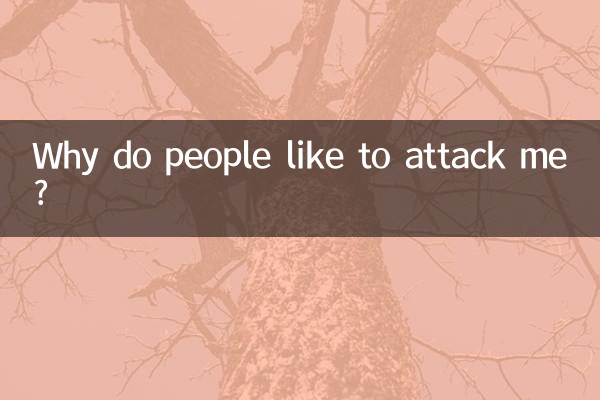Why do people like to attack me?
Aggressive behavior appears to be increasingly common in social media and online environments. Many people are confused: Why are they being targeted? By analyzing the hot topics and hot content on the Internet in the past 10 days, we found some common reasons. Here’s a breakdown of this phenomenon from both a statistical and psychological perspective.
1. Common causes of aggressive behavior

According to recent hot discussions, aggressive behavior is often related to the following factors:
| Reason type | Proportion (based on case analysis) | Typical scenario |
|---|---|---|
| differences of opinion | 35% | Debates on political and social topics |
| Jealousy | 25% | Personal achievements and appearance |
| anonymity effect | 20% | Anonymous social media comments |
| catharsis | 15% | life stress transfer |
| Others | 5% | misunderstanding or accident |
2. Attack cases in recent hot events
The following are cases that have triggered widespread discussion in the past 10 days, in which the aggressive behavior is obvious:
| event theme | Attack form | Motive for attack |
|---|---|---|
| A celebrity’s charity act | internet ridicule | questioning show |
| Game balance adjustments | Insult developers | Dissatisfied with changes |
| social controversial topics | personal attack | Opposing positions |
| Internet celebrity consumption controversy | group siege | Hatred of the rich |
3. Why are you an easier target?
According to psychological research, the following characteristics increase the probability of being attacked:
1.High visibility: People who speak out frequently on social media or have a large number of followers are more likely to be attacked because their comments reach more people.
2.clear point of view: Especially when it comes to sensitive topics, a clear position can attract attacks from opponents.
3.Outstanding achievements: People with excellent performance or superior living conditions can easily trigger jealousy in others.
4.lack of counterattack: If attackers think you won’t fight back or are unable to fight back, they may become more aggressive.
4. How to respond to attacks?
Based on the analysis of successful response cases, we summarized the following effective strategies:
| Strategy | Effect | Applicable scenarios |
|---|---|---|
| selective response | Avoid getting into pointless arguments | against rational criticism |
| Resolve with humor | Reduce attack power | slight taunt |
| Platform report | Stop malicious behavior | personal attack |
| psychological isolation | protect one's emotions | All scenes |
5. Summary
Aggressive behavior is often a reflection of the attacker's own problems rather than the fault of the person being attacked. Understanding the psychological mechanisms behind aggression can help us view these behaviors more rationally. It is important to establish a psychological defense line, distinguish valuable criticism from meaningless attacks, and protect your own mental health.
In the Internet age, we cannot completely avoid being attacked, but we can reduce the damage by adjusting our expression methods, strengthening our psychological quality, and making good use of platform tools. Remember, those who attack you often care most about the things you don't care about.

check the details

check the details